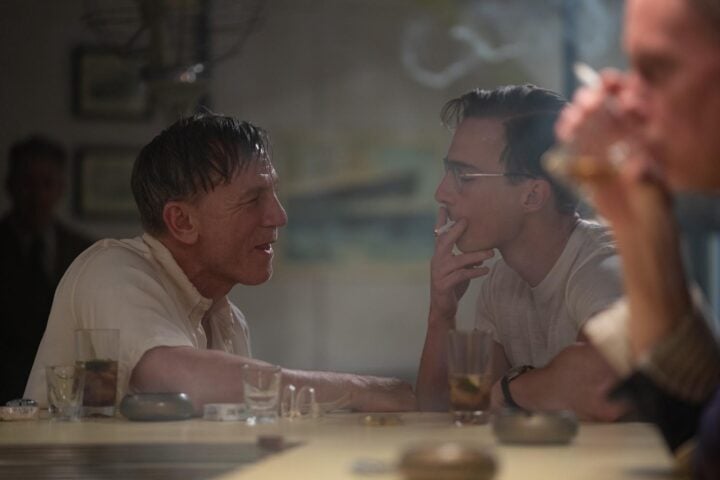Guy Ritchie’s The Ministry of Ungentlemanly Warfare is based on war correspondent Damien Lewis’s book of the same name, which tells the true story of an unsanctioned British military mission to sink the German ships that supplied all of their U-boats around the Spanish island of Fernando Po during World War II. The film also makes a point of announcing that the story comes from documents from Winston Churchill’s first term in office that were declassified in 2016, introducing each shrewd and ruthlessly efficient member of the ragtag crew carrying out this mission with a litany of their qualifications.
Narratively, the film plays out like a traditional historical thriller, yet it turns these men into impossibly proficient, virtually invincible killing machines who dispose of Nazis with such casual ease that they might as well be superheroes. And not only is the leader of this vicious, unruly pack, Major Gus March-Phillips, played by a former Superman, Henry Cavill, but Ian Fleming (Freddie Fox), a member of the British Royal Navy who was involved in setting up this secret mission, later used March-Phillips as the model for the character of James Bond.
But even 007 has been known to get himself in a pickle, with his spycraft and suave maneuverings only taking him so far before he comes across a foe that, at least for a spell, has him dead to rights. The vulnerability of a seemingly invincible force is an essential element of building suspense in the James Bond series, as it is in Ministry of Ungentlemanly Warfare’s other most blatant inspiration, Quentin Tarantino’s Inglourious Basterds.
The misfits at the center of the film recall the Basterds in both their disregard for military protocol and seething hatred of Nazis. Meanwhile, the B plot of Ministry of Ungentlemanly Warfare involves a Jewish woman, Marjorie Stewart (Eiza González), going undercover to face off against a sadistic Nazi officer, Heinrich Luhr, played by Til Schweiger, who starred as a former German army soldier in Inglourious Basterds and whose inspiration for his character here may be traced back to Christoph Waltz’s Colonel Landa from Tarantino’s film.
But for all of its similarities to Inglourious Basterds—from the freewheeling violence, to the cigar-chomping malevolence, to the sardonic gallantry—The Ministry of Ungentlemanly Warfare has little of that film’s relentless tension, while its attempts at cheeky humor are, more often than not, too clever by half. To Ritchie’s credit, he keeps his film moving along at a consistently brisk clip, but that breeziness is also the cause of its weightlessness, rendering its vision of historical events as outright cartoonish, down to the often clownish portrayals of Nazis and the flawless execution of nearly every element of March-Phillips’s plans.
It’s hard to fault Ritchie for trying to inject a sense of fun and levity into a genre that’s often bogged down by somberness and righteous indignation. But in making the Brits and their allies into indestructible models of Anglo-Saxon exceptionalism, the filmmakers have not only created an uneasy parallel to Adolf Hitler’s doctrine of a master race but also drained The Ministry of Ungentlemanly Warfare of dramatic impact and nuance. Individual sequences—particularly the theft of U-boat in the third act—are thrilling in their own right, but the whole is a mishmash of tones that transforms what should have been a gripping, white-knuckle thriller into a slight, forgettable action-comedy that never quite settles on what type of film it wants to be.
Since 2001, we've brought you uncompromising, candid takes on the world of film, music, television, video games, theater, and more. Independently owned and operated publications like Slant have been hit hard in recent years, but we’re committed to keeping our content free and accessible—meaning no paywalls or fees.
If you like what we do, please consider subscribing to our Patreon or making a donation.






